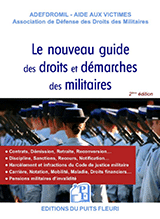By Col. (ret.) Bernhard Gertz, Vice-President
I believe in the need for a common European foreign policy and in particular a Common Security and Defence Policy!
While the continued existence of national armed forces will ensure a certain element of « diversity » in available military structures and capabilities, it inevitably also entails duplication – and thus a waste of scarce resources. In the present economic climate, this is not acceptable. Only a united Europe, with common security and defence policy tools, will have sufficient clout to influence and stabilise the international balance of power.
The « big leap » to a European army will not happen in the foreseeable future, however. It will not be achieved by good intentions alone. Political statements must be followed up with practical measures to overcome national and institutional obstacles.
Significant impediments to achieving shared objectives are profound differences in the so-called « military culture » and, more precisely, in the often differing views about the status of soldiers in state and society. The « European citizen in uniform » does not exist as long as public statements by elected representatives of military staff associations are answered with military arrest. And as long as some European countries, contrary to the European Human Rights Convention, continue to deny and implement the right of freedom of association in the armed forces.
The challenge for us is to optimise « unity in diversity », and the goal of frictionless co-operation of national armed forces based on a division of labour in joint European operations. We owe it to our soldiers, who we expect to put life and limb at risk for our political goals.
EUROMIL, therefore, supports the initiative of the European Parliament to call for « Synchronized Armed Forces Europe » as adopted in the report of the implementation of the European Security and Defence Policy.
« Unity in diversity » requires harmonisation and synchronisation of defence policies. This does not assume abandoning national military identities or settling on the lowest common denominator.
If, for example, Austria, Belgium, Denmark, the Netherlands, Finland, Germany, Ireland, Hungary and Sweden were to request the French government that it grants the right of association to its soldiers, it would probably be unsuccessful. Similarly, even if petitioned, the German parliament is unlikely to abandon its decision-making authority over overseas military deployments.
European best practice – e.g. in issues related to rights and duties, to governing training standards, the level of equipment, medical care and social security arrangements for the protection of soldiers and their families in case of injury or death, can provide the framework for a gradual development of increased and durable co-operation.
Particularly, in those areas of professional armed forces, where the social dimension of security and defence has not yet been fully recognized: Deciding over operational mandates and doctrine, tasks, structures, training, equipment and weapons entails the duty to transform and adjust the social framework conditions of soldiers to the highest standards!
The article has been published in the Europe-wide policy journal Europe’s World. You can download the publication here.




